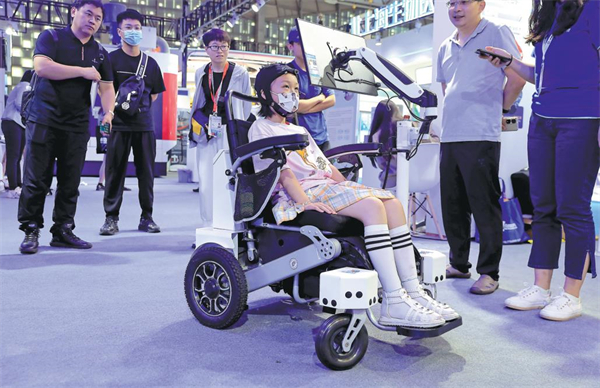
- Home
- Media Center
-
Events
- Wuzhen Summit
- Regional Forums
- Practice Cases of Jointly Building a Community with a Shared Future in Cyberspace
- World Internet Conference Awards for Pioneering Science and Technology
- The Light of Internet Expo
- Straight to Wuzhen Competition
- Global Youth Leadership Program
- WIC Distinguished Contribution Award
- Membership
- Research & Cooperation
- Digital Academy
-
Reports
- Collection of cases on Jointly Building a Community with a Shared Future in Cyberspace
- Collection of Shortlisted Achievements of World Internet Conference Awards for Pioneering Science and Technology
- Reports on Artificial Intelligence
- Reports on Cross—Border E—Commerce
- Reports on Data
- Outcomes of Think Tank Cooperation Program
- Series on Sovereignty in Cyberspace Theory and Practice
- Other Achievements
- About WIC
- 中文 | EN

BCI — the next frontier for high-tech business
Chinese firms ace brain-computer interface field, herald gains for several industries

A visitor experiences a brain-controlled mobility scooter supported by the brain-computer interface technology during the ninth China (Shanghai) International Technology Fair on June 16. Provided to CHINA DAILY
When sci-fi meets China's high-tech business, reality can be better than fiction, generating benefits and gains for a plethora of industries and society at large, creating industry alliances, and giving the nation a leading role globally in a futuristic field pregnant with macroeconomic implications.
That, in fine, is the story of the rapid and fascinating progress that the brain-computer interface, or BCI, technology has been making in the country in recent years.
According to a report by market consultancy Market Research Future, the global BCI market is poised to grow 15 percent annually on average, from $1.91 billion in 2022 to $6.04 billion by 2030.
Small wonder, China, propelled by both the government and private sectors, is off the blocks in the global BCI race, trailing only the United States in certain segments, with focus sharpening on both invasive and noninvasive niches of the emerging industry as well as formulation of international standards.
"The BCI field in China has been developing really fast. In some niche sectors, China stands at the forefront with leading countries in the field," said Zhao Jizong, a renowned neurosurgeon and an academician at the Chinese Academy of Sciences.
If the US boasts Elon Musk-led Neuralink and Facebook parent Meta's Reality Labs in the BCI field, China has Nankai University and Beijing-based startup Neurohua among others that are blazing an utterly fascinating trail in certain segments.
For instance, BCI tech applications like a hairpin-like headband connected to an electronic glove can make a thought floating in the mind materialize on a computer monitor — proof of the rapid progress made from the era of the speech synthesizer that gave voice to British theoretical physicist Stephen Hawking, making him a legend in his own lifetime despite his incurable degenerative neuromuscular disease. BCI applications can help a person with cerebral injury make scrambled eggs and even catch a ball by merely thinking about such acts.
Not just the US and China, even other leading economies are all vying for a strong foothold in the BCI space as the technology has the potential to transform various industries, including healthcare, education, entertainment and communication. According to a report by China's Brain-Computer Interface Industrial Alliance, China and the US are both pioneers and markets for BCI tech applications.
The report stated that China has a lead in noninvasive acquisition and sensing technology. Applications for patents in the segment in China soared to 35 percent of the global total in recent years, followed by 30 percent from the US and 10 percent from Japan.
Zhao of the CAS said that at present, the BCI technology is mainly used in clinical trials in China to diagnose patients with impaired consciousness and to assist patients with mobility impairments to walk using certain equipment.
The US has long been a front-runner in BCI research. In May, Neuralink announced that the US Food and Drug Administration had given the green light to the world's first in-human clinical trial — a huge step forward in BCI development.

The World Internet Conference (WIC) was established as an international organization on July 12, 2022, headquartered in Beijing, China. It was jointly initiated by Global System for Mobile Communication Association (GSMA), National Computer Network Emergency Response Technical Team/Coordination Center of China (CNCERT), China Internet Network Information Center (CNNIC), Alibaba Group, Tencent, and Zhijiang Lab.





